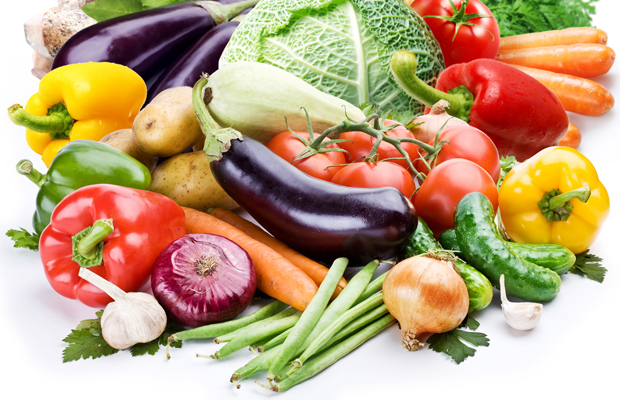
In my last blog post I hopefully got you intrigued about a plant-based lifestyle as a way to achieve a healthy body and your ideal weight.
What is Plant-based Nutrition?
The term “plant-based nutrition” means consuming a whole-foods, plant-based diet that is health-promoting. Proponents of plant-based diets believe that this way of eating is the best way to achieve the healthiest human body.
Plant-based nutrition focuses on the nutrient density of foods. We eat foods with the highest proportion of nutrients to calories. Plants are packed full of phytochemicals, antioxidants, vitamins, minerals and fiber, which all have health promoting effects. Animal foods contain cholesterol and saturated fat which promote disease and weight gain.
Those following plant-based diets only eat whole foods. The term whole food is taken literally here to mean “the whole food,” such as: apples, broccoli, brown rice and beans that have not been stripped of their original packaging. We do not eat processed packaged foods such as cookies, crackers and cereals, which contain multiple ingredients and food additives and preservatives. By not eating processed packaged foods, we don't consume food additives, preservatives, hormones, antibiotics, chemicals, GMOs, added salt, added sugar, or added fat.
What are my best tips for making a successful transition to a plant-based lifestyle?
Educate yourself.
Find your true motivation.
Make a plan.
Choose a start date.
Stick to it 100% for 3 weeks.
Get support.
Weigh yourself no more than once a week.
Analyze how you feel after completing the 3 weeks.
I will elaborate on each one…
1. Educate yourself. Watch the film Forks Over Knives and buy the 300 recipe cookbook of the same name (published in 2012). Go to my website Joyfulelephant.com where you can find links to resource materials and recipes. Watch You Tube videos of the plant-based Dietitian Julieanna Hever and Chef AJ of “The Chef and the Dietitian.” Before you embark on any diet, especially one that is this life-changing you should spend time understanding it and deciding if it's what you want to do. Then, fully embrace it!
2. Find your true motivation. Ask yourself: Why do I want to do this? What results do I want to achieve? How will I feel once I have achieved them? In order to be successful at achievement we need to not only find our motivation, but also clearly visualize the goal. It is this vision—the picture that we have in our heads—that will guide us.
Here's my quick story to help you to formulate your motivation. I love being outdoors, hiking and biking, and I love travel that involves a bit of adventure and endurance. However, for years I struggled with so much joint pain and headaches that these activities became very difficult for me. Due to pain, I was not able to enjoy being physically active in the outdoors, and if I got a migraine on a vacation I'd be out of commission for several days—a waste of time and money.
In my thirties, I spent less and less time with my spouse enjoying the outdoor activities we both loved. I sought a lot of different medical and alternative treatments and never experienced full relief of my symptoms until a friend of mine introduced me to the healing properties of a plant-based diet. When I embarked on my transition from the standard American diet to one that captures the health-promoting qualities of fruits and vegetables, I kept visualizing adventure vacations with my husband. I pictured everything I could do and enjoy again if I were pain-free.
3. Make a plan. For most of us, transitioning from the typical American diet to a plant-based one is a huge change. In order to be successful we not only need to plan what we're going to eat, but also when to cook and when to shop. Most plant-based supporters, including myself, cook on Sundays and Wednesdays and shop on Fridays and Tuesdays. Many plant-based meals can be made in 30 minutes or less, and made days ahead of time. Even though there are many quick options, it's still best to plan ahead.
4. Choose a start date. Once you you've decided why you want to this, and how you are going to do it, you need to choose a date to begin. Once you begin, that is day 1. You then need to stick to your plan for 21 days. Ideally, choose a period of time without travel, huge events or any major milestones that would set you off track.
5. Stick to it 100% for at least 3 weeks (21 days). This is the amount of time for this change to become habit forming and comfortable. It's also the amount of time that most people need in order to notice the difference in energy increase, better sleep, less pain and fatigue and to get over any digestive issues from a dramatic change in diet.
6. Get support. Don't isolate yourself and make sure that you tell your friends, family and co-workers why you've chosen to eat for health. Never use the word “diet.” This word is associated with something temporary and has negative connotations. Instead say, “I've decided to eat for health and consume more fruits and vegetables.” Maybe you could even share a bit of your story as to why you're motivated to do this.
Here are two of my clients' motivational statements:
“I decided I didn't want to be a burden to my family. I wanted to decrease my chances of having a debilitating stroke that would require my family to take care of me. I also wanted to enjoy fun things in life like playing golf well into my old age and dancing at grandchildren's weddings.”
“I don't want to feel shameful about my body anymore. I want to look in the mirror and see a thin young woman again. I'm excited about the prospect of my partner liking what he sees and enjoy quality romantic time with him again.”
7. Weigh yourself no more than once a week. If your primary reason is weight loss, do yourself a big favor and don't obsess over numbers. Weigh yourself only once a week. Looking at daily numbers will cause you to second-guess your eating plan. Plan for the week, stick to the plan then look at the results at the end of the week.
8. Analyze how you feel after completing the 3 weeks. I really encourage people to power through the 21 days. With any new eating plan, there will be highs and lows. There will be days you will feel great and other days not so much. However, after 3 weeks, a new normal will have set in. Our body stabilizes and we can accurately judge the results of our work. Good luck!
In great health,
The Joyful Elephant
















